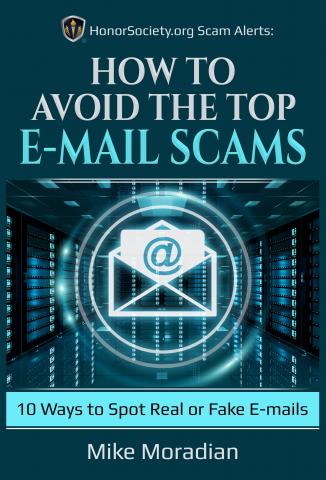Honor Society Foundation Scam Protection Tip #5: The Offer is Unrealistic
Aug 17,2020
This is from the Honor Society published book called "How to Avoid the Top E-mail Scams" by Mike Moradian, written to help protect our member and student community from common online scams. To learn more about the book or to purchase a copy, click here.
Tip #5: The Offer is Unrealistic
Trust us – we want free things just as much as the next person. It’s innate to all human beings – nothing is more appealing than being told you just won a million dollars from a contest you never entered. That’s why we buy lotto tickets, spend millions at casinos, and enter giveaway contests on social media just about every day. Winning something for free, or something that will change your future, like a scholarship, is a dream come true.
That’s why when we receive an email promising this dream, it can be hard for us to immediately look away. Phishers know this, which is why they pander to your childlike wonder by sending you an offer that is unrealistic.
By now, we all know how life works. Life isn’t easy for anyone, which is why if something seems too good to be true, most times it is. No one is going to send you a million dollars for no reason. You are going to need to apply to some program, express interest somewhere, and verify yourself, as well as prove your worth. You will never just have thousands of dollars dropped onto your lap. It’s just not how life works.
Therefore, your gut is going to tell you when an offer is unrealistic.
Tips for Spotting Unrealistic Emails
We’re going to explore these tips further in coming chapters, but here are a few ways to spot unrealistic emails:
- You received something that you did not apply for. If you did not apply for a scholarship, why would you receive one in your inbox? That’s not how it works today. You need to proactively express interest in something if you expect to hear back from the company or agency. They are not going to award random people with money “just because.” That would make no sense, nor bode well for the company.
- You did not have to exert yourself in any way. As we mentioned above, life is challenging, which is why nothing worth having ever comes easy. If you want to earn free money or a scholarship, you are going to need to exert yourself in some way. You might need to make an account somewhere, write an essay, fill out a form, etc. You need to, in some capacity, prove that you are worthy of that money.
- The offer requires you to click on a link to receive it. If the email requires you to click on a link to obtain whatever it is that it’s promising, step away. Remember: if you applied for a scholarship somewhere and won it, the email is going to tell you everything you need to know. It probably won’t require you to click on any link, but rather, respond to the email in the inbox. There is just no need to go to some foreign platform somewhere.
- The offer is vague and requires you to click on a link before it tells you anything else. If the offer is so vague that you really don’t know what you just won, chances are, it’s a phishing virus. Again, you will be prompted to click on the link to find out what you did win, which makes no sense.
- The offer is outrageous, like $20,000 or more. Sure, there are probably offers this large floating around the internet somewhere. However, they are unlikely, which means receiving notification of winning 100k is not going to make any sense. Phishers are pandering to your hope that you just won some life-changing amount of money, which is why they are going to make the offer outrageous. They aren’t concerned with being reasonable. They are using a shock-tactic to elicit a response.
The next time an email tells you you’re the new owner of a Porsche, understand that it’s probably not true. It’s definitely means that scammers play into this kind of excitement and hope to get you to click on a link, no doubt. But once you understand it’s the lay of the land today, you will realize that many “free” email are often fake – and it will no longer upset you as much.
We are going to explore a topic we just discussed here further, given its importance in the following chapter.
For more on how to protect yourself online, read tips from our published book below:
Intro: How to Avoid the Top E-mail Scams
Tip #1: Look for the Display Name
Tip #2: Do Not Click the Links
Tip #3: Scan for Spelling Errors
Tip #4: Look for Personal Information Requests
Tip #5: The Offer is Unrealistic
Tip #6: You Never Initiated the E-mail
Tip #7: The Email Requests You Send Money
Tip #8: The Message Contains Some Kind of Threat
Tip #9: The Email Claims to be From a Bank or Government Agency
Tip #10: Your Gut Tells You Something is Wrong
Extra Credit #1: Tips for Staying on Top of Phishers
Extra Credit #2: Knowing When It's a Real Email: 5 Tips





